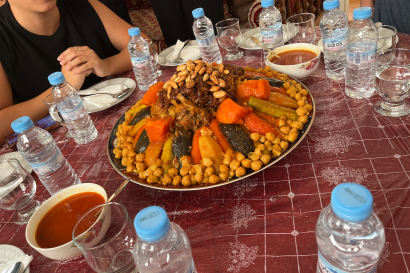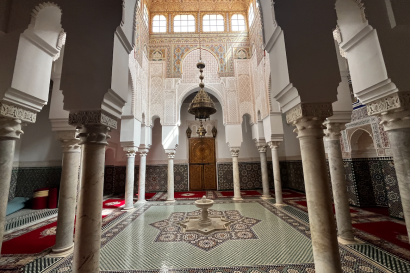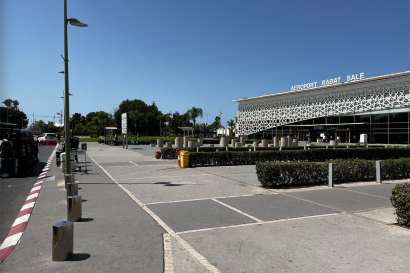He didn’t slice completely through the neck with the first cut, but blood started streaming out anyway. With its neck half-off, it started huffing and puffing. Its bottom half twitched. Then he went in for a second slice, except this time he used a sawing motion, as if portioning a tree trunk.
The neck still resisted. In one final exasperated attempt, he grabbed hold of its head and twisted until it was severed from the body. At last, the sheep was dead.
It isn’t easy to make a sacrifice. The angle of the knife, the applied force, the anticipation of the blood spatter’s direction. It is all very precise, but my host father knew what he was doing. This wasn’t his first time killing a sheep.

Kaoutar, Taha and myself (right to left) enjoying the presence of the sheep two days before the killing.
In fact, he does it every year around this time for the Feast of the Sacrifice. Eid al-Adha, as it is known in Arabic, is one of the most important holidays in Islam. It is also the time when millions of Muslims make the hajj, or obligatory pilgrimage to Mecca. The sacrifice of the sheep symbolizes Abraham’s willingness to sacrifice his son as God commanded, although Abraham is later allowed to perform oblation by killing a ram instead.
In celebration of the feast, families typically have five days vacation, time devoted to eating, spending time with extended family, and eating. Oh, there’s also a lot of eating. Shops and restaurants close, forcing families to buy food before the start of the holiday. With the streets eerily empty and quiet, only the painful cries of sheep and daily calls to prayer can be heard.

My host dad and uncles prepare for the skinning of the sheep.
As an observer for most of the kill (although I did hold down one of the sheep’s legs during the second slice), I found the whole ritual fascinating. It wasn’t even the act of killing the sheep, an animal that I petted and fed for two days prior to the sacrifice, that left me comatose. Even seeing the bludgeoned, decapitated sheep flooding the common room floor with blood, knowing full well it would be barbecued and served to me on a dinner plate in less than three hours didn’t faze me, as I imagined it would.
Instead, it was the placid nature of my host father and family members that caught me by surprise. The ease at which they slaughtered the sheep, hung it up as if our house was now a meat market, skinned its body, excavated its fat and cleaned up its trace was incredible.

The head was roasted within an hour of the sacrifice.
I stepped back for a moment and realized that this is commonplace in Morocco and the rest of the Muslim world. Ordinary families, provided that they can at least afford to buy a sheep, do this every year…in their own homes. It’s easy to get caught up in the sight of the sacrifice, but realizing the aforementioned fact puts into perspective one of the significant cultural differences between North African and Western religious traditions.
“As the traveler who has once been from home is wiser than he who has never left his own doorstep, so a knowledge of one other culture should sharpen our ability to scrutinize more steadily, to appreciate more lovingly, our own.” ~ Margaret Mead from her book, Coming of Age in Samoa

Brennan Weiss
<p><span style="color: rgb(29, 29, 29); font-family: Arial, Verdana, sans-serif; font-size: 12px; line-height: normal; background-color: rgb(237, 237, 237);">My name is Brennan Weiss and I am an aspiring international news reporter from Philadelphia, Pennsylvania. I am a Journalism major with French and Global Studies minors at Marist College in Poughkeepsie, New York. Since spending my freshman year of university in Florence, Italy, I’ve grown to love adventure and travel. I hope my work as an international journalist allows me to navigate the world endlessly until every culture, land, and people has been met.</span></p>






